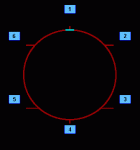Difference between Solid Conductor and Stranded Conductor
Solid Conductor:
It consists of single piece of metal wire. It is cheap for manufacturing.Skin effect is higher in solid conductors as at higher frequencies current flow on the surface of the conductors results in the increase in the effective resistance. The main disadvantage of the solid wire is its more rigid property. It cannot be bent easily
Stranded Conductors:
Stranded wire consists of sub conductors touch each other. It is costlier to manufacture compared to solid wire. For the given current carrying capacity the size of the stranded conductor is large compared to solid wire. Different elements of strands can be wound together to get the transmission line of desired property (eg: ACSR conductor contains Aluminum and Steel stands wound together). Proximity and skin effect is reduced using stranded conductors.
Difference between Bundled Conductors and Composite Conductors
Composite Conductors:
In Composite conductors sub conductors touch each other. Composite conductors are typically stranded conductors. In Composite conductors different elements are used (In ACSR conductors aluminum has the properties of light weight, good conductivity and rutlessness and steel has the property of high tensile strength). Composite conductors are employed as they are flexible compared to solid conductor. Composite conductors reduce proximity effect and also reduces skin effect up to certain extent.
Bundled Conductors:
Bundled conductors are employed in Extra High Voltage (EHV) transmission as at higher voltages corona effect is significant. In bundled conductors sub conductors are placed as certain distance throughout the transmission lines. This reduces the corona discharge loss and interference with the communication lines nearby.










